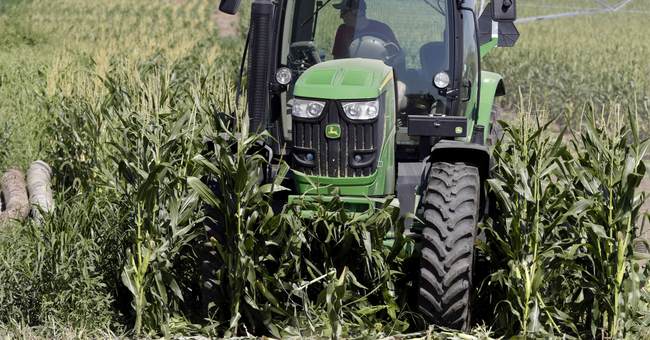
Posted on 05/12/2019 5:29:40 AM PDT by Kaslin

I grew up on an Iowa farm surrounded by fields of black dirt. Every spring our crops burst forth from the ground full of life and opportunity. I was a boy working side-by side with his dad and grandpa too. It’s a story that in my lifetime has all but disappeared in Iowa. Small family farms have been replaced by corporate growers with thousands of acres. Family farm or corporate group, the rich soil of Iowa and the Midwest has been feeding the world for many years and with support from our nation it will continue do so.
After centuries of agriculture being a bedrock of American society and the national economy, the country’s farming sector now finds itself suffering from insufficient governmental investment. This has affected all facets of the industry, including a research and development (R&D) arm that desperately requires capital to pursue technological innovations in the field.
In the current environment, these advancements are more critical than ever. With the world’s population projected to balloon up to almost 10 billion by 2050, overall food production demand is also expected to increase by as much as 70 percent. Factor in the other obstacles facing today’s modern farmer, such as deadly livestock diseases and the damage brought on crops by climate calamities, and it’s clear that this most crucial aspect of American society is being neglected right when it needs governmental attention and support the most.
Agriculture remains a key cornerstone of the US economy, contributing $1 trillion to GDP and accounting for one in 10 jobs nationwide. However, governmental support for the industry has fallen sharply in recent years; in 1940, agriculture received as much as 40 percent of the overall budget earmarked for R&D, while today it receives less than 2 percent. This is despite the fact that investment in the sector has an estimated return of as much as 20 to one, raising questions about why the government isn’t devoting more funds towards it.
The drop-off in investment has come at a time when farmers are struggling to make ends meet. While beef production rates have steadily increased over the last five years, so too have prices – and at an unsustainable speed. Hamburger meat, for example, has shot up at over double the rate of general inflation, while the ongoing trade war with China has removed the market for many US staples, sending prices crashing to rock-bottom levels.
These kinds of difficulties have forced many farmers out of business (auctioneering firms specializing in selling off farm equipment from retiring families have seen business boom by 30 percent compared to last year). Meanwhile, the average age of farmers has increased from 50 in 1974 to 58 today, as young people leave the profession in search of more profitable pastures. Workers are also harder to come by; at the start of the 20th century, one in three Americans lived on farms, but today less than 1 percent of the population does. What’s more, mass migration towards urban metropoles have made farming an unfeasible career option.
This diminishing agricultural army is now not only short of manpower and of the funds to finance them, but is also running up against bigger, less predictable and more damaging foes than ever before. New and invasive diseases such as Bovine Respiratory Disease – which affects more than one in five US cattle and costs the industry an estimated $692 million each year – make it harder for farmers to achieve their necessary quotas and turn a profit.
Flooding has hurt farmers this year. The excessive flooding that plagued one million acres of farmland in the Midwest this spring is estimated to have cost the national economy a whopping $12.5 billion, with the agricultural industry bearing the brunt of that shortfall. The government has also indicated that its disaster fund will not be applicable to crops or profits lost in the phenomenon, leaving farmers out of pocket to the tune of millions of dollars.
While the above outlook may sound bleak, the good news is that there are a number of potential solutions to these problems, notably technological innovation. A shortage in labor could theoretically be addressed by a mechanical workforce, with plans already afoot to use machines at the seeding, spraying and harvesting stage in projects as diverse as robotic strawberry pickers, self-driving tractors and weed-detecting automatons.
In a world where over 70 percent of our freshwater is consumed by the agricultural industry, these kinds of resource-saving technologies could prove to be invaluable. At the same time, precision agriculture is expected to reduce herbicide consumption by as much as 90 percent, curbing the number of harmful contaminants the Earth is subjected to and optimizing crop growth in one fell swoop. Simply put, technology has the potential to be a no-brainer cure-all for all the industry’s ills.
Of course, these kinds of optimistic predictions are still some way from fruition and even further from mass adoption. However, with the right financial backing behind them, there’s no reason why they couldn’t provide the answer to the agricultural quandary that the world so desperately demands. Instead, it seems as though the US government have put the industry out to pasture at exactly the time when it is needed the most.
It’s no surprise that China – which invests nearly twice as much as the US in agricultural science – have an overall output that is worth over double America’s. Instead of shying away from the farming community that has provided the country’s backbone for so long, it’s time the government stood up straight and supported its agricultural sector with the funds it needs to allow the country to become the industry forerunner that it is clearly so capable of being.
What else can we shore up in the US by throwing money at it, and having 80% siphoned off by lying and criminal politicians?
Agriculture doesn’t begin to count for one in 10 jobs nationwide—unless I suppose you count restaurant and grocery store workers!
And there is no special reason that agriculture needs government investment. If new tech and products are economically viable, then those who develop and market them will be rewarded in the free market system as in any other sector.
What we need to do, which is the opposite of what Kushner is apparently doing with Trump’s immigration plan, is to stop with importing cheap labor for it. That more than anything is what is retarding ag’s investment in tech. And without capital investments, individual jobs don’t become more valuable and more highly rewarded.
There is no good reason for us to be importing fruits and vegetables from the poison cesspool that is China. Notice, we never our produce marked as such—and people wouldn’t buy it if they knew China to be the source.
Again, we over-trade with China. We should be growing and delivering our food locally!
Tractor monkeys: learn to code.

> Flooding of one million acres cost the economy $12.5 billion
$12,500 / acre.
You are just a nasty, bitter little man, aren’t you.
After centuries of agriculture being a bedrock of American society and the national economy, the country’s farming sector now finds itself suffering from insufficient governmental investment. This has affected all facets of the industry, including a research and development (R&D) arm that desperately requires capital to pursue technological innovations in the field.
...
I won’t discuss it until the government stops forcing me to put corn in my gas tank.
I like to point out hypocrisy when ever I see it. The Right deserves it as much as the left.
Government “investment” disproportionately favors those who can pay for DC lobbyists — mainly big corporate agricultural concerns.
Government regulations favor large corporate farms over small family farms. Estate taxes cause small family farms to have to be sold to pay death taxes.
Manufacturing is what made America an dynamic economic powerhouse and not agriculture. Agriculture is ghetto.
Cotton was king for over 100 years. It gave us our start.
We’ve got to love our farmers. They are vital.
Taxpayer dollars poured into farming is not s solution.
The drop-off in investment has come at a time when farmers are struggling to make ends meet.
The absence of real numbers tells me that the R&D has likely not dropped in real terms, just that all other government spending has skyrocketed.
Exporting agri goods an importing durable goods is the road to serfdom. This is the type of mercantilism that started the Revolutionary war.
Fixed it.
Farmers survived for millennia without government handouts; they can do it again. All those do is disrupt markets and create a cycle of dependency that deepens every passing year.
Yes, because eating is just so-so-yesterday.
Funny if the USA can close a factory and import toaster ovens then the USA can certainly import the grain to make the toast. Tractor monkeys need to compete with the global grain market JUST LIKE EVERY OTHER AMERICAN. Or they could learn to code.
Disclaimer: Opinions posted on Free Republic are those of the individual posters and do not necessarily represent the opinion of Free Republic or its management. All materials posted herein are protected by copyright law and the exemption for fair use of copyrighted works.